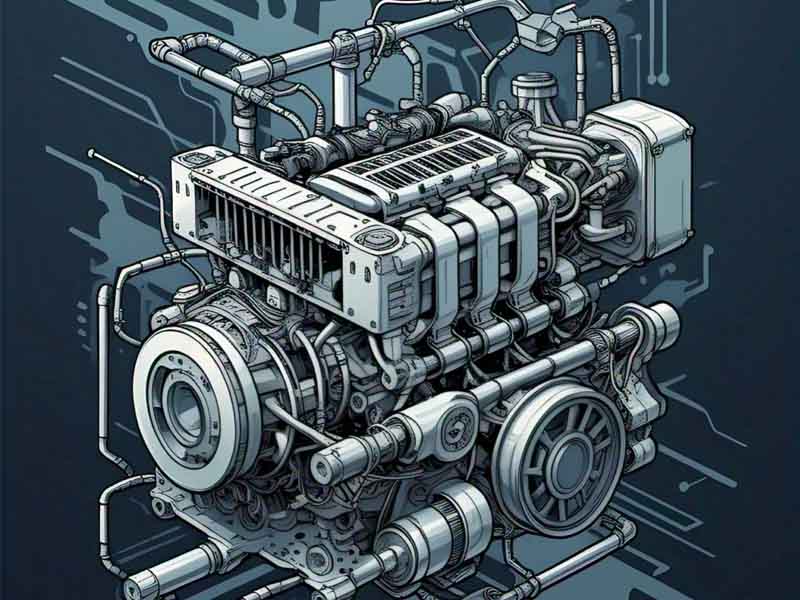
Dieselspecialists – As the world pushes for greener alternatives and reduced emissions, the science behind diesel engines in hybrid systems has become an increasingly important focus in the automotive industry. A hybrid vehicle, which combines two or more power sources, generally incorporates an electric motor alongside a traditional internal combustion engine (ICE). While many hybrids use gasoline engines, an emerging trend in hybrid technology involves the integration of diesel engines into these systems. The marriage of diesel power with electric propulsion is not just a technical feat but also offers significant benefits in terms of fuel efficiency and environmental impact.
Diesel engines have long been praised for their fuel efficiency and higher torque output compared to gasoline engines. Diesel’s higher energy density means it can provide more power with less fuel, which is a crucial advantage in hybrid systems. In hybrid vehicles, the diesel engine typically serves as the primary power source, especially during high-load or long-distance driving, while the electric motor can take over for lower-speed, city driving or provide assistance during acceleration.
This combination is ideal for reducing fuel consumption and lowering carbon emissions. Diesel engines in hybrid systems are designed to operate at optimal efficiency, reducing the need for frequent fuel consumption while ensuring the vehicle maintains a powerful performance. The integration of an electric motor helps to further optimize fuel economy by using regenerative braking to recharge the battery, allowing the vehicle to make the most of both power sources.
The synergy between diesel and electric engines is where the real innovation happens. Diesel engines can provide consistent power, especially in situations that demand sustained energy, such as highway driving. The electric motor, on the other hand, can handle stop-and-go traffic or provide quick bursts of power during acceleration. Together, they create a balanced system where each component works to enhance the vehicle’s efficiency and reduce emissions.
“When the Sun Sets, Crafting Unforgettable Nightlife”
Moreover, the ability to switch seamlessly between the diesel engine and the electric motor, or use both simultaneously, is what defines a hybrid system. This not only improves fuel economy but also extends the range of the vehicle. With a diesel engine’s greater efficiency and an electric motor’s ability to recover energy during braking. Hybrid systems can significantly reduce the environmental footprint of traditional vehicles.
Although diesel engines are traditionally seen as less eco-friendly due to their higher NOx emissions. Their integration into hybrid systems helps mitigate these concerns. The hybrid design can reduce the overall emissions output by allowing the diesel engine to operate more efficiently and for shorter periods. The electric motor’s contribution helps minimize the vehicle’s reliance on the diesel engine in urban driving conditions, where emissions are often more problematic.
However, there are still challenges in making diesel hybrids a widely accepted solution. Diesel engines are more complex than gasoline engines, and their integration into hybrid systems requires advanced engineering. Emissions regulations, particularly in Europe, have become stricter, putting pressure on manufacturers to develop cleaner diesel technologies. Additionally, the cost of hybrid systems, particularly with diesel engines. Remains higher than traditional gasoline-powered vehicles, making affordability a key consideration.
The Science Behind Diesel, the future of diesel engines in hybrid systems looks promising. As manufacturers continue to invest in cleaner diesel technology and the demand for efficient. Long-range vehicles increases, the diesel hybrid market is expected to grow. Hybrid technology itself is becoming more refined. With improvements in battery technology and energy management systems helping to make diesel hybrids more viable.
Furthermore, as governments around the world push for stricter fuel efficiency standards and emission reductions. Diesel hybrids offer an effective solution for heavy-duty applications such as trucks, buses, and long-distance vehicles. Where electric-only power sources are currently less practical. These vehicles, powered by both diesel engines and electric motors. Can bridge the gap until fully electric alternatives are more widely adopted for long-haul transportation.
The science behind diesel engines in hybrid systems represents a significant advancement in automotive technology. Combining the best aspects of both diesel and electric power. With better fuel efficiency, improved performance, and reduced emissions. Diesel hybrids are positioned to play a key role in the transition to more sustainable transportation. While there are still challenges to overcome. The potential benefits of diesel hybrid systems make them an exciting avenue for the future of the automotive industry.
“World Chocolate Day, A Sweet Celebration Across the Globe”
Diesel Specialists | Expert Engine Solutions for Diesel, Gasoline & More - the role of fuel injector is crucial in…
Diesel Specialists | Expert Engine Solutions for Diesel, Gasoline & More - big data engine performance monitoring revolutionizes how industries…
Diesel Specialists | Expert Engine Solutions for Diesel, Gasoline & More - The global diesel engine market outlook is entering…
Diesel Specialists | Expert Engine Solutions for Diesel, Gasoline & More - Pemilik mobil diesel yang mengejar performa sering mengandalkan…
Diesel Specialists | Expert Engine Solutions for Diesel, Gasoline & More - Major engine makers and fleet operators are accelerating…
Diesel Specialists | Expert Engine Solutions for Diesel, Gasoline & More - Persaingan otomotif global kini berputar pada performance emissions…